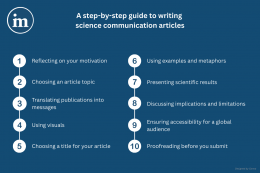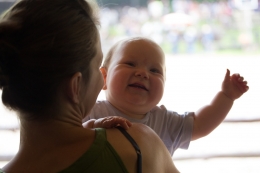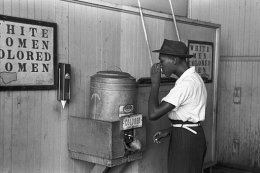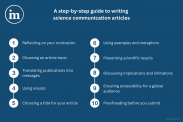latest articles
Children in front of a screen: what is the impact of technology on their development?
The use of technology, particularly digital devices, is having a negative impact on children’s psychological and physical development. This is largely due to two factors: today’s generations are growing up in an increasingly... / more
- written by Marica Notte & Daniela Renzi
A spoonful of misinformation helps the medicine go viral. How misinformation spreads and who bears the consequences.

Back to January 2021: you are at home because of the COVID-19 pandemic and decide to scroll through social media for some much-needed distraction. Within seconds, you come across posts about microchips in vaccines, COVID spreading through 5G networks, and President Trump... / more
- written by Lotte Slootmaekers, Sanne Houben & Irena Boskovic
A step-by-step guide to writing science communication articles

Effective science communication bridges the gap between science and society. This guide outlines practical strategies for turning psychological research into engaging, accessible articles, including topic selection, structuring the article, and responsible presentation of results. / more
- written by Maike Ramrath & Stella Wernicke
When loving hurts: The pervasiveness of stigma towards consensual non-monogamy

Consensual non-monogamy is often seen as immoral, childish, or even harmful. This article reviews how stigma towards consensually non-monogamous relationships is widespread... / more
- written by Stefano Ciaffoni, Yasin Koc & Silvia Moscatelli
newsletter
Keep me updated about new In-Mind articles, blog entries and more.
most read articles
The good, the bad, and the ugly of the Dove Campaign for Real Beauty
The Dove Campaign for Real Beauty has been called a lot of things, from a “game changer” and “a breath of fresh air”, to “hypocritical”, “sexist”, and “sneaky”. So why has the campaign, whose major innovation was to use ads that featured real women rather than airbrushed models or celebrity spokespersons, sparked so much controversy? Taking... / more
- written by Angela Celebre & Ashley Waggoner Denton
- edited by Rosanna Guadagno & Reine van der Wal
That human touch that means so much: Exploring the tactile dimension of social life

Interpersonal touch is a fundamental but undervalued aspect of human nature. In the present article, the authors review psychological research showing that even fleeting forms of touch may have a powerful impact on our emotional and social functioning. Given its... / more
- written by Mandy Tjew A Sin & Sander Koole
- edited by Hans IJzerman
Intergroup Contact Theory: Past, Present, and Future

In the midst of racial segregation in the U.S.A and the ‘Jim Crow Laws’, Gordon Allport (1954) proposed one of the most important social psychological events of... / more
- written by Jim A. C. Everett
- edited by Diana Onu
No strings attached: Are “friends with benefits” as complicated in real life as they are in the movies?

Many people become “friends with benefits” to avoid drama and to have sex without getting tied up in emotions; however, the reality is that having a friend with benefits often becomes complicated. Why is that, and is there anything you can do to avoid these complexities? In... / more
- written by Justin J. Lehmiller
- edited by Dylan Selterman
InMind blog
Join the In-Mind team: Help us make psychology accessible to everyone!

What is In-Mind? In-Mind is a volunteer-driven project... / more
Politics doesn’t define how most people see themselves
The social groups to which we belong shape how we see... / more
Reality check: Call for abstracts for a special issue on clinical psychology and psychotherapy
This special issue Reality Check: What clinical science really tells us about promoting mental health aims to provide brief review articles on current... / more











